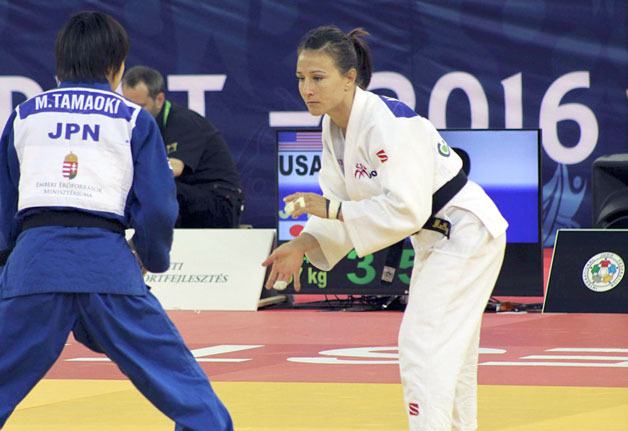Marti Malloy is looking to upgrade.
No, the Oak Harbor native isn’t hoping to add minutes to her cell phone plan, jump to first class on an airplane flight or enhance her cable package.
She deals in precious metals.
Or, should that be precious medals?
Malloy, a 2004 graduate of Oak Harbor High School, won a bronze medal in judo in the 2012 London Olympics. She is an Olympian once again, and in a few weeks will attempt to add some gold to her vault when she competes in the 57kg class in Rio de Janeiro.
Malloy entered the London Olympics as an underdog and a bit of an unknown. This time around her blip is clearly showing up on the judo radar.
She is going Rio as the world’s No. 3-ranked judoka in her division and as one of the favorites.
“I know with 100 percent confidence I can win,” she said. “I am focusing on being prepared to do just that on the day I need to do it.”
That day is Monday, Aug. 8. Each weight class completes its bracket in one day, when a fighter faces as many as five four-minute bouts.
“It’s a whirlwind,” Malloy said.
Sumiya Dorjsuren is ranked No. 1. Malloy faced her only once, back in 2010, and won. She defeated second-ranked Jandi Kim of Korea once in three bouts, losing a few months ago in a close match.
Shines on big stage
Malloy has the reputation of being at her best when the stakes are the highest.
“Ask any coach, trainer or competitor, I am known to show up when it is the important.”
She heads to Texas July 31 to be outfitted in Olympic gear, then she is off to Rio, where she’ll stay until Aug. 23.
This week, she will join the U.S. Olympic team in Boston for two weeks of “grueling” training.
“Making the Olympic team is great, but the training is terrible,” she said. “They push you to your limits and then ask for more.”
She has grown, she said, since London.
Making the 2012 team was a “dream come true” and an “amazing” experience.
“To be with all those athletes coming together for a common goal, a common good, was awe-inspiring,” she said. “It was all a blur.”

Benefits of the bronze
She left with a bronze medal and a new-found belief in her abilities.
Entering the games, Malloy won a handful of medals in international competition but still doubted herself.
“I would ask myself, ‘Am I good enough? Are you capable enough to do this?’” she said. “I never ask that now.”
The year after London, she said, was her most successful because of the injection of confidence.
The bronze medal also made her realize she needed to work harder and evolve as a judoka.
“You become a target,” Malloy said. “Others begin watching film on you, so you need to make adjustments and become a smarter fighter.”
The bronze medal also resulted in other benefits.
“The United States Olympic Committee rewards you when you prove yourself,” she said. “They pay for your training.
“They also gave me a full scholarship to complete my masters.”
Malloy, who now lives in San Jose, finished her masters in mass communication in December at San Jose State University.
One thing she didn’t get was the recognition (and endorsement deals) medal-winning athletes in more high-profile sports like swimming, gymnastics and track and field receive.
“That doesn’t bother me,” she said. “You realize you did the same thing they did — win a medal — but I didn’t get into judo to make money. I just wanted to be successful; I never thought I could make a living out of it.”
Challenges of Rio
Competitors aren’t the only obstacle facing athletes in Rio.
The Zika virus, pollution and security issues are concerns for those heading to Brazil.
“It (Zika) is something on your mind,” Malloy, 30, said.
The USOC, though, has one goal — win big medals — so they will do whatever it takes to protect their athletes. Whether it is some special repellant or special jackets, they will make sure the athletes are healthy.
Security, however, is a concern for Malloy; not for herself but her family and friends.
Her parents (Marty and Merry Malloy), boyfriend (David Torres) and several college friends will fly to Rio to support Malloy.
She understands she can retreat to the athletes’ fortress, the Olympic Village, but the public is on its own.
“I have been to Brazil 10 times and understand the crime,” she said. “I want to make sure my family and friends practice safe traveling.”
Homecoming
Malloy’s first steps toward the Olympic Dream came at the age of 6 under the tutelage of George Morris at a judo program offered by NAS Whidbey. So, after the Olympics, will she return to Oak Harbor?
“I’d love to, but I plan on winning, being famous and too busy,” she said with a laugh. “Actually, I’d like to come back for about a month and relax.”
Sounds like a golden idea.


